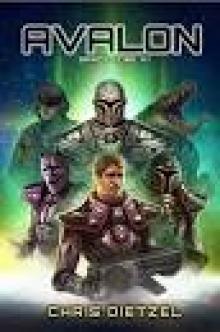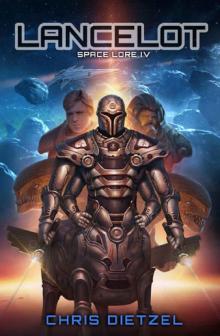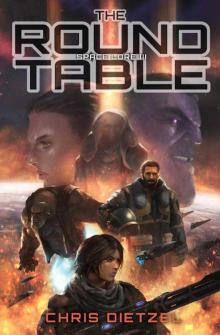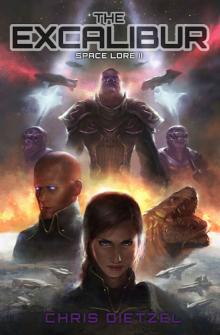- Home
- Chris Dietzel
Lancelot Page 2
Lancelot Read online
Page 2
Overnight, the Round Table grew from sitting twenty-four representatives to having over four hundred. Immediately, the people living on the moons sought to have representatives of their own. Their argument, which was deemed valid, was that it wasn’t their fault they lived on a celestial body that revolved around a planet rather than a celestial body that revolved around a sun.
Because of this, the Round Table now had to accommodate over nine hundred representatives. There was no hall or chamber on Edsall Dark large enough to fit such a table. The new system required so many chairs that a circular seating arrangement was thought to be a waste. The circumference of a table able to accommodate almost one thousand seats required a room wide enough to park a Nebulon II cruiser. Rows of seats would be much more practical, especially from the vantage point of the carpenters who were working at a feverish pace to cut and sand the wedges and rings for the expanded table.
“The idea was that there would be no seat better than any other,” Hector had argued.
The same idea applied to the notion proposed by a Trachnodorian. “Build levels of smaller Round Tables,” the worm-like and swamp-colored alien had said. “Not one large Round Table but many manageable tables, one above another.”
The idea didn’t sound outlandish, but Hector knew what would happen. Someone would get it in their head that a seat at the highest floor of the Round Table was more prestigious than a seat at the ground level of the Round Table. Again, Vere’s original idea that no one should be given higher status than anyone else was maintained. One giant table was constructed.
As a result, the CamaLon spaceport was expanded and then converted into a colossal meeting hall. Inside this Great Hall, as it became known, carpenters worked for weeks to build a table large enough to seat over nine hundred people. Vere’s original idea for the Round Table was kept alive, but as a result Hector hovered at a table so gigantic that he couldn’t clearly identify who was sitting on the other side.
He placed his hands on the edge of the wood in front of him. “We have to remember,” he told everyone gathered in the hall, “that the Round Table was never meant to become a force for invading other peoples.”
As he spoke, translation software changed his words into dozens of different alien languages so that everyone could understand him. He could hear a computer emitting the squawks and claps understood by the Erucian representative beside him.
Hector continued, “When the idea of the Round Table came about, it was meant to be a path for each kingdom to come together. It was supposed to end intergalactic conflicts by uniting each sector. It was not meant to be a tool for threatening any planet or kingdom that has not yet joined our alliance.”
A winged and feathered alien, roughly one hundred seats away from Hector, let out a series of screeches.
From the speaker in his ear, Hector heard a calm computer voice say, “But the Round Table is meant to unite everyone. What about the kingdoms that refuse to join? Shouldn’t their people have a chance to live in the same freedom as those we represent?”
Hector was about to say that it should be up to the citizens of each kingdom to decide what happened to them; if they weren’t passionate about the Round Table and were happy with the way they lived, then that was their choice. But before he could say anything, an alien with no physical body, only a silvery envelope of energy, began to hum.
A second later, Hector heard the alien’s translation in his ear. “The Round Table cannot sit by and watch as people in other kingdoms remain under the chains of their rulers. The Round Table was created to unite the entire galaxy. Not just part of it. All of it. We have a responsibility to do just that.”
“Now, I—” Hector started to say.
But before he could tell everyone assembled that the mission of the Round Table had never been to start some crusade across the galaxy but to instead show each kingdom that peace was possible, two other aliens began to speak.
One of the two was a tiny Feedorian who chose to speak in broken Basic rather than his native language. As a result, the translation software had a difficult time trying to figure out when it should and shouldn’t try and interpret as the winged alien offered his opinion. The other alien to speak was a Lerrk that grumbled and growled and sneered and who spoke loud enough to drown out the Feedorian.
The monotone translation began in Hector’s ear. “We would be letting the other kingdoms down if we didn’t send our support. Don’t we want them to be free of the rulers who refuse to join us? It’s not the people’s fault that their rulers are stubborn. Leave it to General Reiser to show them that the Round Table won’t sit idly by and let enslaved people remain that way.”
A tiny MaqMac blurted out a noise that was translated simply as, “General Reiser!”
Hector shook his head. That wasn’t the purpose of the Round Table. It wasn’t why Vere had put out the call for other kingdoms to join her cause five years earlier. A dull pain throbbed in his shoulder, reminding him of what he had lost. He knew better than to rub at the sore spot. It didn’t actually exist except in his head because his shoulder, as well as his entire arm, had been lost in the blood tunnels beneath Edsall Dark when he had been fighting for this very cause. In its place was his gravitronic arm, with metal spheres where his shoulder, elbow, and wrist joints would have been, a stream of energy holding each together. Five multi-cylindered metal appendages, each flowing with the same gravitational energy that kept his shoulder and elbow in place, acted as fingers. The new arm gave him the same strength he was accustomed to. It also, like his energy disc, reminded people of the impacts of war in a way that an engineered replacement arm, made of human tissue, could not.
The arm allowed no sensation of pain, but when this discussion arose in the Great Hall he always experienced a burning sensation where his old arm had been.
Everyone in the Great Hall had been selected by their people to act as the voice of reason, and now these very representatives were calling for the same types of unnecessary confrontations that had plagued the universe since the beginning of galactic travel. It was the Round Table’s mission to ensure peace throughout its member planets, moons, and colonies, not to ensure every kingdom across the entire galaxy joined. Kingdoms would join when they were ready. Not every ruler and every citizenry would be prepared to immediately accept the Round Table just because others had. These things would take time and patience.
That was what Hector wanted to tell the Lerrk and the MaqMac and the others who endorsed General Reiser’s mission. Before he could, though, a fur-covered Ren asked the status of General Reiser’s forces. A human male, middle-aged, with a shaved head and eyebrows that came down to obstruct the tops of his eyes, said that General Reiser had entered the Cartha sector without encountering any resistance. The Round Table would soon seat more representatives. A Toaden said General Reiser was doing a marvelous job and that the mission of the Round Table was being carried out to perfection.
“But that’s not the mission of the Round Table!” Hector wanted to yell.
Before he could, a woman, half-human and half-Trorian, asked about the scientists Arc-Mi-Die had kidnapped and whether there were any updates on their whereabouts.
An Ignis Moris, sitting in a seat designed to withstand his fiery skin, asked about the search for not only the missing scientists but for the warlord as well.
Hector closed his eyes and sighed. The representatives had already turned their attention to the next topic.
4
For months, Arc-Mi-Die hadn’t seen daylight. He remained in a room with no windows and no direct access to the outside world. For years, no one but his guards and androids had actually seen him with their own eyes. The warlord knew that extended periods of confinement could lead to a disconnect with reality, to a mental breakdown from which he might never recover. It didn’t matter if it was an involuntary or voluntary confinement; the result was the same: he would slowly go insane. His isolation was far from being a punishment, however. Rather, it was h
is personal wish and the only way he knew he could execute his ultimate plan.
After the battle at Dela Turkomann, in which he had double-crossed Vere and the CasterLan Kingdom, Arc-Mi-Die had set about becoming the most feared and notorious warlord the galaxy would ever know. It was a formidable challenge, mainly because of how dastardly others before him had been.
Two thousand years earlier, Prince Geng-Ess-Hawn, having been defeated by his brother and losing his rightful kingdom, set about destroying everyone and everything that flew the Hawn banner. With only a small band of Trulsilisk mercenaries, Geng-Ess-Hawn brought about the deaths of millions of people, destroyed all sentient life on three colonies, and eventually brought about the end of an entire kingdom.
A thousand years later, the warlord Chase Rungallion had become the galaxy’s most wanted man after kidnapping the children of the CasterLan, Vonnegan, and Doom rulers. The androids he used for the job accidently killed all three children, and Chase still owned the record for the largest galactic ransom ever offered for a single person.
Arc-Mi-Die wasn’t interested in ransoming children and he wasn’t concerned with bringing about the end of some relative’s kingdom. He would achieve infamy for a plot that no other warlord would even entertain.
It had taken a few years for Vere to get out of the Cauldrons of Dagda and for the combined forces of what would become the Round Table to defeat Mowbray. In all that time, Arc-Mi-Die worked in the shadows to further his plan. He still laughed when he imagined the expression on the face of the Round Table general who had been dispatched with a complement of Solar Carriers, Hellships, and Havoc Gunships, when he had arrived at the Dan-Two-Ine system. Their mission had been to bring the warlord to justice for his betrayal years earlier. The joke was on them. Arc-Mi-Die had long since departed from the volatile maroon and grey planet he had once called home. Only later would he find out that a young pirate with grand ambitions of his own had claimed the abandoned colony for himself. It was that pirate’s profoundly terrible luck that within weeks of doing so, the newly formed Round Table fleet showed up looking for a warlord.
No one outside Arc-Mi-Die’s organization had seen him since then. The Round Table fleet could look as long as they wanted but they would never find him. Only when he was ready to begin the next phase of his plan would they remember to curse his name. And even then, they wouldn’t be able to locate him.
5
From space, Cartha-6 looked nothing like other hospitable worlds. Rather than the random swirls of blues and greens found elsewhere, Cartha-6 had distinct ecosystems that ran in near perfect rings at varying latitudes around the planet’s surface. Both poles were white because of the ice and snow-covered mountains there. The next loop of ecosystem from both poles was green. This was filled with forests and fields. The next part of the planet was blue. Cartha-6 only had two main bodies of water, a pair of oceans that circled the entire planet. They were divided by the largest desert in the entire Cartha sector, which spanned the equatorial middle of the planet. From space, none of these ecosystems seemed to blur into the next. The result was a planet of unnatural division and splendor in an otherwise chaotic galaxy.
The leaders of Cartha-6 had given Julian no indication that they wanted a battle. They hadn’t powered up any of their defensive measures. Nor had they deployed the few ships that made up their navy in order to confront the approaching Round Table fleet.
Both reactions, Julian knew, would have been pointless. He guessed the leaders on Cartha-6 were also aware of their circumstances. The range of ships in General Reiser’s fleet ensured he could defeat any planetary shield system or offensive measure. They also guaranteed that any kingdom’s ruler would lose the vessels they were foolish enough to deploy. Better to save the ships and have their kingdoms become part of the Round Table than to lose the vessels and face the wrath of his people after the kingdom became part of the Round Table anyway.
Such had been the case when Julian’s ships had arrived at the capital of the Fad-En-Mic Empire—which, considering it consisted of only one planet and two moons, stretched the meaning of the word empire when compared to the former Vonnegan Empire. Lord Fad-En had welcomed the ships and treated them as guests. Hours later, a single royal transport roared away and Lord Fad-En was never seen again. His people had immediately embraced the idea of the Round Table, which served to convince Julian and the representatives back on CamaLon that they were doing the right thing.
A similar result had been achieved when the Round Table fleet approached the Arid Territories. Instead of offering any kind of resistance with his limited military, Baron Treat saw he was outmanned and outgunned and stood down. He retracted his earlier refusals to join the Round Table as if it had all been some sort of misunderstanding.
“Of course we’ll join!” Baron Treat had said upon arriving at the castle wall to greet his visitors. “We want nothing more than to be a part of your lovely Round Table.”
A moment later, the gate opened and Julian, Warwick, Exeter, and the others were treated like long-lost friends. Baron Treat, understanding neither he nor anyone in his family would be selected to represent the territories at the Round Table, went into a self-imposed exile at one of the many palaces he owned. The citizens of the Arid Territories, happy to be free of the Baron, were glad to let him live in peace on a remote part of the planet. All of the Baron’s other possessions, gained through the harsh systems he had imposed on his people, were given back to the populace at large.
Julian hoped the same thing would happen when he descended to Cartha-6. Prior to departing, Warwick, Exeter, and a group of nine other officers joined Julian aboard his HC Ballistic Cruiser.
“I hope for the best,” Julian told them, “but be ready for anything.”
Each of them began to assemble the armor they would be wearing down to the planet. It took a team of support bots to assist in putting each suit together. This was because while the armor bore a slight resemblance to space armor, it was fully outfitted with offensive and defensive measures, with three times more reinforcement and armor and the most advanced motor, life-support, and information processing systems found in the galaxy. The units transformed the wearer into something resembling a huge robotic mech. It was for this reason that the suits were known as Combat Artillery Bio-environments. The wearer of a CAB suit could live inside the armor without fear of being hurt by most handheld weapons while also being surrounded by enough munitions to destroy just about anything in sight.
The suits were as much a personal transport and computer system as they were armor. The wearer still had two arms and two legs, but every motion was amplified by the suit, giving them strength and endurance beyond anything even the strongest human could dream of. The suits were cumbersome and packed enough weapons and resources to transform a six foot tall soldier into a ten-foot tall walking tank.
The only reason they weren’t used more often was because they cost so much. Not many leaders—the representatives of the Round Table included—were willing to spend the same amount of money on a single CAB suit as they could spend on a pair of Llyushin fighters or dozens of normal suits of space armor.
Julian knew the point had been raised many times during the Round Table’s discussions. The only person who took every opportunity to speak on behalf of the CAB suits was Hector.
“Why send men and women into battle if they don’t have the equipment necessary to ensure their safety as much as possible?”
Everyone else who sat at the Round Table thought it better to build another starship or fighter. After all, why waste money on CAB suits for twelve people when you could build a vessel that could be manned with a thousand people and deter any other forces from wanting to begin a conflict in the first place?
Julian didn’t have a say in the matter. He wasn’t a member of the Round Table. He was simply the general in charge of carrying out its orders. That didn’t stop him from respecting Hector for his stance.
Julian had known the CasterLan he
ro since they were both at the academy together. Instead of going on to lead ships into battle, as Hector once had, Julian had continued his studies. It wasn’t enough for him to learn military tactics. In the galaxy, everything was related in one way or another. That much he was sure of. To focus only on military tactics was foolish. Instead, he wanted to learn everything. The history of the galaxy. The different methods of governance. The evolution of each alien species. One day, all of the information he accrued would lead to him being able to outthink anyone who stood in his way.
The door to the loading room opened. Julian turned and saw Talbot standing there, hands by his side, watching everyone get into their CABs. His son did not address anyone or even smile to one of the other junior officers. He merely observed what was going on.
The two of them looked at one another for a moment. Then Talbot looked away, nodding to Brigadier Warwick, and Julian wished no one else was there so he could have a normal conversation with his boy.
Instead, he called out, “You’ll be on the next ground party.”
He had said it because he wanted his son to know he hadn’t forgotten about him, wanted Talbot to know he would have his chance to shine. Talbot’s eyes darted left, then right, then went back to meet Julian’s for the briefest moment. Then he was looking at his hands. His jaw twitched. His face turned red.
Realizing his son had been watching out of curiosity rather than some desire to go down to Cartha-6’s surface, Julian cringed. Everyone looked at the doorway to see who was there. The attention only made Talbot’s face redden even more.
“I’m sorry,” Julian wanted to say. “That’s not what I meant to happen.”
Instead, he watched his son pause a moment longer, just long enough to demonstrate that he wasn’t leaving out of embarrassment, and then disappeared. Julian sighed and told the crewman at his shoulder to make sure the ion batteries were fully charged.

 The Last Teacher
The Last Teacher The Theta Patient
The Theta Patient Avalon
Avalon Lancelot
Lancelot The Hauntings of Playing God (The Great De-Evolution)
The Hauntings of Playing God (The Great De-Evolution) The Round Table (Space Lore Book 3)
The Round Table (Space Lore Book 3) The Theta Prophecy
The Theta Prophecy The Excalibur (Space Lore Book 2)
The Excalibur (Space Lore Book 2) The Green Knight (Space Lore Book 1)
The Green Knight (Space Lore Book 1)